Exchange and Oracle Calendar Server (OCS) are different in how they assign their Delegate / Designate permissions, but it’s less an apple vs. orange difference as a grapefruit vs. orange difference: both are noticeable more for their similarities than their pronounced differences relative to other calendaring systems.
There are two levels of permissions relevant to this discussion:
- Object level permissions (for individual calendar entries and tasks)
- User level permissions (e.g., to an administrative assistant or co-worker)
Object Level Permissions
Let’s deal with Object Level Permissions first since it’s a simpler comparison.
Oracle has four different permission levels for Calendar and Task objects:
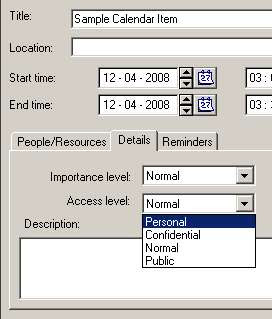
Outlook and Exchange have only a “Private” option:

Translating these during a migration is pretty simple: “Personal” and “Confidential” in OCS map to “Private” in Outlook/Exchange. In the case of a Sumatra migration this happens as the data is being converted from OCS export format into our intermediate database.
User Level Permissions
OCS starts with object permissions and then allows the calendar owner to set permissions for other users based on those object permissions. Where OCS is Data-oriented in its permissions model, Exchange is Folder/User oriented. This leads us into the User Level Permissions.
Let’s take a look at the Oracle Calendar Server side.
John Lennon makes Jerry Garcia his Designate in Oracle Calendar:
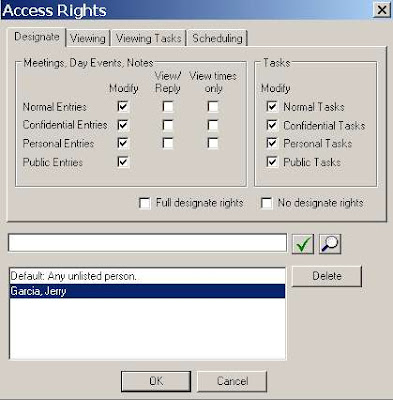
Here you have the only options relevant to a migration being: “Modify” and “View.”
Why is “View times only” not relevant for a discussion of calendar designate rights migration into Exchange? Because Exchange has no mechanism to deny access to free/busy information on a user basis.
Also note that in OCS a user has the option of specifying different access for different object types. That is – you can be more stringent with Confidential as opposed to Public data. This capability does not exist in Exchange. At all. So we’re going to revisit this issue later when we’re trying to decide how to migrate these permissions from OCS to Exchange.
So let’s turn our attention to Exchange and see what options there are when Zyg Furmaniuk makes Judy Morrison a Delegate via Outlook:
 You basically have three levels of access (other than the trivial case of None) you can grant:
You basically have three levels of access (other than the trivial case of None) you can grant:
Reviewer
Author
Editor
And the scope of these is pretty much on an Outlook Folder level (though in the case of Calendar you need to also grant access to the Calendar and the Free-Busy information). I.e., You can selectively grant access to the Calendar or the Email Inbox.
So you can think of “Modify” in OCS mapping to “Editor” and “View” mapping to “Reviewer” pretty easily.
Oracle Permission "Modify" maps to Exchange Permission "Editor"
Oracle Permission "View/Reply" maps to Exchange Permission "Reviewer"
Oracle Permission "View Times Only" is irrelevant in Exchange Permissions
But there remains a question: Given that OCS users have several gradations not available in Exchange – how do we do a mapping?
We at Sumatra at this point broke it down to as simple a question as we could put to the Administrators: “Do you want to give the maximum rights or the minimum rights?”
The way this manifests itself on our OraCalReader utility is the choice between ALL designate access rights set to Modify or ANY set to Modify.

Since the only other option is “Reviewer” in the target Exchange any rights not set to Modify are set to Reviewer.
Any View rights are automatically set to “Reviewer” rights since the object level access in OCS does not come into play in Exchange.
We do not set “Delegate can see my private items” on the Exchange side. Why? Because there’s enough else going on in a migration – folks can forget that they don’t want some information shared post-migration. Keeping private on means maximum security and you can always dial it to where you want it post-migration.
Other Exchange Delegate notes:
- Exchange has several possible clients (Outlook, Entourage, Outlook Web Access) at several different release levels with varying degrees of cross-platform and cross-version capability. Be sure to examine your own environment carefully.
- The Sumatra process only handles Calendar permissions, not Task permissions. Could we do Tasks? Yes. But you’d need to convince us it’s a valid business case.
- Regardless of the level of Delegate access set by the end user in Outlook, Delegate rights in OWA are read-only. See http://calendarservermigration.blogspot.com/2008/11/seeing-delegated-calendar-in-outlook.html
- MOST IMPORTANTLY: Using these methods to set Delegates in Exchange will overwrite any delegate rights a user has set prior to migration. Consider yourself warned.
The User Perspective
What does the user GETTING permission experience?
In OCS, Jerry Garcia as Designate of John Lennon simply selects File-Agenda-Open As Designate and sees the following:

Jerry gets a convenient list of everyone he has permissions for:
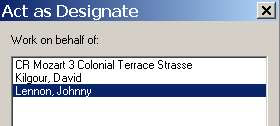
And it is very simple to orient yourself:
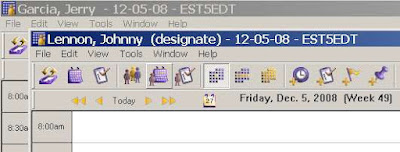
This user experience is VERY DIFFERENT in Microsoft Outlook. Here we use Outlook 2007 as our example. Zyg has given Judy permission to view his calendar.
In Judy’s calendar, she has no indication of this (except for a possible email notice from Zyg). In order to set up her client to see Zyg’s calendar she must first explicitly open it and select “Zyg” from the directory list:
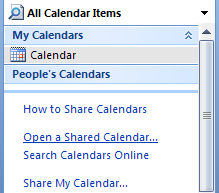
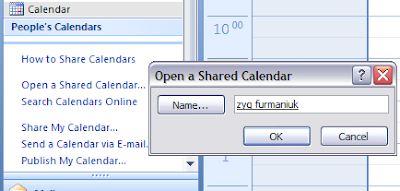
Once selected once the option to view is a check box.









 You basically have three levels of access (other than the trivial case of None) you can grant:
You basically have three levels of access (other than the trivial case of None) you can grant:




 Once selected once the option to view is a check box.
Once selected once the option to view is a check box.